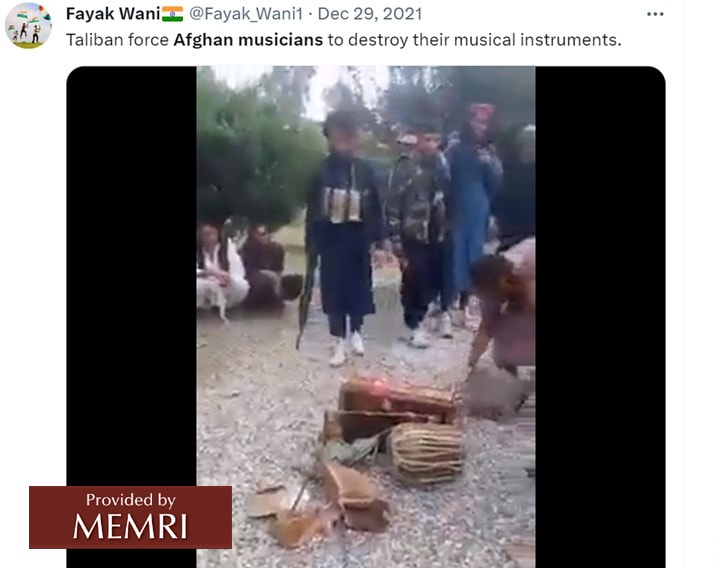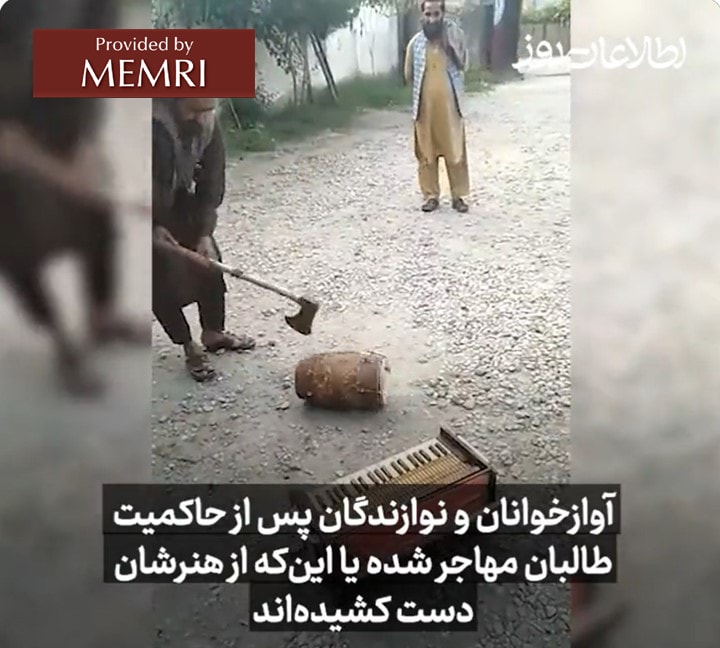Music is a powerful means of expression, allowing individuals to convey their deepest emotions and life experiences. This art form goes beyond language, culture, and politics, but it clashes with the interpretation of Islam by the Afghan Taliban government. In Afghanistan, where things are chaotic, this beautiful way of expressing one's soul is being violently crushed.
The Taliban, who took control in August 2021, regularly attack musicians and destroy their instruments, often depriving them and their families of their livelihoods. It is outrageous to see the Taliban rulers silencing the voices of so many talented Afghan artists who simply want to share their music with the world.

Afghan Taliban forces parade musicians as punishment for playing music (image: Twitter.com)
Jawid Shawqi, once a singer who performed on television and at weddings for a living, has seen his life drastically change since August 2021. Due to the Taliban's control of Afghanistan and their ban on music, Shawqi now spends his days sitting on the side of the road, wearing a handkerchief around his head, polishing boots from morning till evening.
the Taliban regime deems singing and musical instruments to be "un-Islamic," and possessing such instruments is considered a crime according to shari'a. "The Taliban are enemies of happiness and music, and life has become hell for the people," Jawid Shawqi said.
Abdul Qadeer, a former professional folk singer in Afghanistan, was forced to abandon his musical career and open a roadside electric motor repair shack in Kabul after the Taliban took control and implemented shari'a. "I am a vocalist, and I used to earn by singing at different functions," he said in an interview with Anadolu Agency.
"Due To The Taliban Government's Persecution, Afghan Musicians Are Fleeing Kabul To Remote Areas Or Abroad To Save Their Lives Or Simply Hide"
Ahmad Gholami, a skilled 25-year-old musician from Afghanistan, dedicated his life to playing the tanbur, a musical instrument. Due to the Taliban's strict implementation of Islamic law regarding music, Gholami and fellow musicians in Bamiyan province have been silenced. "I feel like a dead fish out of the water. If I do what the Taliban says, my life will be wasted," Ahmad Gholami stated. He further said, "I do not think I can go on without music. I am really confused."
SUPPORT OUR WORK

According to a report published by Afghan news website Tolo News, a disturbing video has gone viral on social media platforms, depicting a distressing scene involving musicians in Kunar province. The video shows two local musicians being forced to walk while carrying their instruments, specifically tablas or drums, around their necks by their straps, and with their hands restrained behind their backs. The perpetrators behind this act are the Afghan Taliban.
Nasir Sakhi, a local singer, expressed his helplessness: "We are very disappointed. We are weak now and get weakened by seeing such videos. Now we do not know what to do. What should we do when we are being insulted? Where should we go? Are we not from this country?" The distressing sentiments expressed by Nasir Sakhi highlight a deep sense of disappointment, hopelessness, and vulnerability. It is disturbing to see singers scared and questioning their place in their own homeland.

The Afghan Taliban destroy musical instruments (image: Twitter.com)
Due to the Taliban government's persecution, Afghan musicians are fleeing Kabul to remote areas or abroad to save their lives or simply hide. They are concerned about the future of art under Taliban rule. As the Taliban gain more control in Afghanistan, patrons of Afghan music in neighboring Pakistan are also closing their offices and terminating licenses with Afghan musicians.
After the Taliban's takeover, the Afghanistan National Institute of Music (ANIM) has been closed, and the students and staff face an uncertain future. Dr. Ahmad Sarmast – the school's founder and director – expressed concerns for the students' safety and explained that some had returned their instruments to the school to prevent them from being discovered by the Taliban. Dr. Sarmast said: "It is a time of devastation for our dreams and hope..."
The Taliban, based on shari'a, have also enforced a ban on playing music at wedding halls. The Ministry for the Propagation of Virtue and the Prevention of Vice issued instructions to the owners of wedding halls to prohibit music at wedding parties because they consider music to be against Islamic teachings. A manager of a wedding hall wondered: "If there is no music at a wedding, then what is the difference between a wedding ceremony and a funeral ceremony?"
"Afghanistan's Only Women-Run Radio Station, Sadai Banowan, Which Means 'Women's Voice,' Has Been Closed Down For Playing Music During Ramadan And For Violating The Afghan Taliban's Laws"
Ahmad Fanoos, a renowned singer and former judge of "Afghan Star" – the equivalent of American Idol – faced threats throughout his career in Afghanistan. After receiving a note calling him an unbeliever, he decided to leave the country after the Taliban's takeover of Afghanistan in August 2021.
Afghanistan's only women-run radio station, Sadai Banowan, which means "women's voice," has been closed down for playing music during Ramadan and for violating the Afghan Taliban's laws. The radio station had been broadcasting for ten years and employed six female staff members, who are now jobless.
Music is forbidden and not broadcast on national radio and television in Afghanistan, but the Taliban promote their own songs voiced only by men, which honor their leaders and jihad. These songs serve as a source of entertainment for the Taliban, who listen to them on their phones, in their cars, and elsewhere.

Taliban members destroy musical instruments with an axe (image: Etilaat Roz)
Although the Taliban fighters use music for their own entertainment, the Taliban government does not realize – or at least does not acknowledge – that music can be a powerful source of healing for their wounded Afghan nation. Janan Mama, a resident of Ghazni province in Afghanistan, has found peace in playing the flute after the killing of his two sons on the same day, who were members of the Afghan army under the former government.
Janan Mama said that playing the flute helps him reduce the sorrows in his heart. He said, "When the pain crushes me, I start playing the flute. Not only in tragic moments – I play in happy times as well," adding "I have no wish except peace and calmness in the nation; I wish for a comfortable life for Muslims (Afghan nation) to breathe comfortably."
The International Music Council (IMC) expressed "grave concern" that Afghan people and musicians are "denied their music rights, just as Afghan girls and women have been deprived of their basic human rights." The council said, "Today, as during the first reign [1996-2001] of the Taliban, the group has once again turned Afghanistan into a silent nation and denied the Afghan people, children, and adults the right to enjoy access to music, to learn, experience, create, perform, and express themselves through music freely."
* Mantasha Ansari is a Research Assistant at MEMRI's South Asia Studies Project. This article was originally published by Afghan news website Hasht-e-Subh on July 13, 2023.




